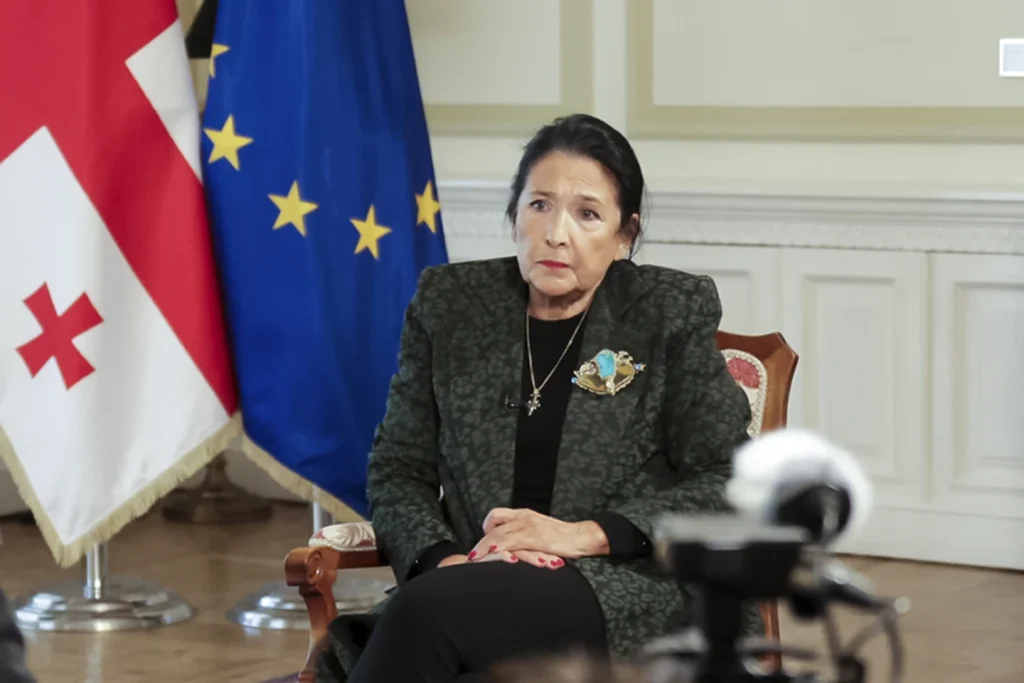
Georgia’s president on Monday urged the West to support opposition protests of the official results of a weekend parliamentary election in which the governing party was declared victorious amid voting irregularities and allegations of Russian meddling.
President Salome Zourabichvili, who refused to recognize the official results, told The Associated Press that the South Caucasus nation has fallen victim to Russian pressure aimed at derailing Georgia’s plans to join the European Union.
“We’ve seen that Russian propaganda was directly used,” said Zourabichvili, a fierce critic of Georgian Dream, the governing party. She said the government has been “working hand-in-hand with Russia,” and “probably” received help from Moscow’s security services.
EU Commission spokeswoman Nabila Massrali said Monday that Georgian Dream’s election campaign was “directly inspired” by Russian propaganda and there were “unprecedented levels of disinformation.”
On Sunday, Zourabichvili stood alongside opposition leaders and urged Georgians to join a rally on the main street of the capital, Tbilisi, on Monday night to protest what she called a “total falsification, a total stealing of your votes.”
The Central Election Commission said the Georgian Dream party received 54.8% of Saturday’s votes with almost all ballots counted. The party — established by Bidzina Ivanishvili, a shadowy billionaire who made his fortune in Russia — has become increasingly authoritarian in the past year, adopting laws similar to those used by the Kremlin to crack down on freedom of speech and LGBTQ+ rights.
Protest is the only way Georgians can “express that their votes have been stolen, that their future has been stolen,” she told AP in an interview.
She said she hopes the U.S. and EU back the demonstrations.
“We need to have the firm support of our European partners, of our American partners,” Zourabichvili said, adding that it was in the interests of “a powerful Europe” to be present in the Caucasus and for the region to be stable.
Asked if she wants sanctions imposed on Georgian officials, Zourabichvili told AP that it’s up to Western leaders but that “certainly time has not come to to renew relations with authorities that are not legitimate at this point.”
In a statement, U.S. Secretary of State Antony Blinken urged Georgia’s political leaders to “respect the rule of law, repeal legislation that undermines fundamental freedoms, address deficiencies in the electoral process, and move Georgia toward its Euro-Atlantic future.”
Massrali said the EU expects the Central Election Commission and other authorities “to swiftly, transparently and independently investigate and adjudicate electoral irregularities and allegations.”
The Kremlin has rejected the accusations of interference.
“We aren’t meddling in Georgia’s internal affairs, and we have no intention of meddling,” Kremlin spokesman Dmitry Peskov said. He countered that it was the West that had tried to influence the vote.
Asked about Zourabichvili’s call for the Georgians to join protests, he described it as an attempt to destabilize the country.
Parliament speaker Shalva Papuashvili, a member of Georgian Dream, accused the president of creating “a coup scenario” that goes “against the constitutional order and democratic elections.”
The EU suspended Georgia’s membership application process indefinitely because of a Russian-style “foreign influence law” passed in June. Many Georgians viewed Saturday’s vote as a pivotal referendum on the opportunity to join the EU.
The election campaign in the nation of 3.7 million people, which borders Russia, was marked by a bitter fight for votes and allegations of a smear campaign. European observers said the election took place in a “divisive” environment marked by intimidation and instances of vote-buying, double voting and physical violence.
During the campaign, Georgian Dream used “anti-Western and hostile rhetoric … promoted Russian misinformation, manipulations, and conspiracy theories,” said Antonio López-Istúriz White, head of the European Parliament monitoring delegation.
Election observers said instances of intimidation and other violations were particularly noticeable in rural areas.
Georgian Dream scored its highest share of the vote — almost 90% — in the Javakheti region of southern Georgia. In the capital it received no more than 44% in any district.
Prime Minister Irakli Kobakhidze, a member of Georgian Dream, described his party’s success as “impressive and obvious,” and that “any attempts to talk about election manipulation … are doomed to failure.”
Initial figures suggested voter turnout was the highest since Georgian Dream was first elected in 2012. The party has vowed to continue pushing toward EU accession but also wants to “reset” ties with Georgia’s former imperial master, Russia. In 2008, Georgia fought and lost a brief war with Russia, which then recognized the independence of two breakaway Georgian regions and bolstered its military presence there.
European Council President Charles Michel urged Georgian officials to “swiftly, transparently and independently investigate” the electoral irregularities and said Georgian Dream should demonstrate its “firm commitment” to the EU.
Hungary’s Victor Orbán was the first foreign leader to congratulate Georgian Dream and will visit Georgia on Monday and Tuesday.
Zourabichvili said he was a “special friend” of Georgian Dream and dismissed his visit as a “political play.”
Orban does not have “any mandate from the EU Council” to visit Georgia, Massrali said on behalf of the EU.